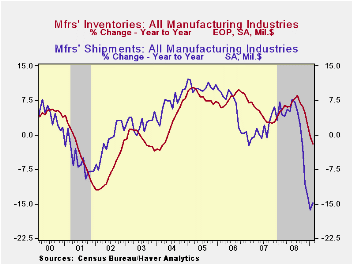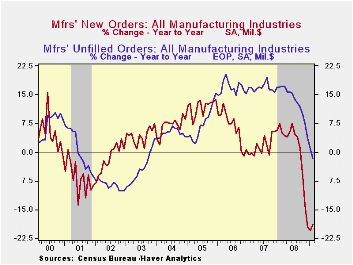 Global| Apr 02 2009
Global| Apr 02 2009U.S. Factory Inventory Decumulation At A Record Pace
by:Tom Moeller
|in:Economy in Brief
Summary
The manufacturing sector continued to shed inventories during February at a record rate. A 1.2% cutback followed declines of 1.1% and 1.9% during the prior two months. Moreover, that amounted to a 15.4% annualized rate of stockpile [...]

The manufacturing sector continued to shed inventories during February at a record rate. A 1.2% cutback followed declines of 1.1% and 1.9% during the prior two months. Moreover, that amounted to a 15.4% annualized rate of stockpile decumulation which was a record for a three-month period. The series dates back to 1958. Of course, that accelerated rate stems somewhat from the 72.0% rate of decline in petroleum inventories, due mostly to lower prices. Nevertheless, excluding oil factory inventories fell roughly 1.0% during the last two months. The 10.6% three-month rate of decumulation was only slightly exceeded in 2001.
The three-month rates of inventory destocking in several industries have been more than notable. Inventories of electrical equipment & appliances have fallen at a 27.6% rate while textile product inventories were down at a 36.6% clip. Steep production cutbacks pulled furniture inventories down at a 21.7% rate since November while inventories of primary metals fell at a 32.9% pace. Lesser rates of decline were registered in the machinery industry (-4.7%) and by computers & electronic products (2.3%).
Factory shipments continued lower during February prompting the continued lowering of inventory levels. Shipments fell a modest 0.1% but even excluding oil and its lower prices shipments fell at 17.8% rate over the last three months. That was led by a 67.1% rate of decline in automobile shipments. Electrical equipment shipments also fell hard at a 22.8% rate and computers were off at a 20.8% rate. In the nondurable goods area, apparel shipments fell at a 16.4% rate, about the same as for paper products.
Total factory orders recovered during February roughly half of the sharp January drop but over three months the decline was at a 24% annual rate. That was led by a 26% rate of decline in computer orders while motor vehicle orders fell at a 25.1% rate and electrical equipment orders fell at a 13.2% rate.As for order backlogs, they are easing substantially. Sharp declines during the last three months have been at a record 18.1% annual rate.
The Manufacturers' Shipments, Inventories and Orders (MSIO) data is available in Haver's USECON database.
What do we know and not know about potential output? from the Federal Reserve Bank of San Francisco can be found here.
| Factory Survey (NAICS, %) | February | January | Y/Y | 2008 | 2007 | 2006 |
|---|---|---|---|---|---|---|
| Inventories | -1.2 | -1.1 | -2.0 | 2.1 | 3.7 | 8.2 |
| Excluding Transportation | -1.4 | -1.2 | -4.8 | -0.6 | 2.7 | 7.9 |
| New Orders | 1.8 | -3.5 | -18.8 | 0.1 | 1.9 | 6.2 |
| Excluding Transportation | 1.6 | -2.4 | -15.1 | 3.1 | 1.2 | 7.4 |
| Shipments | -0.1 | -2.6 | -14.8 | 1.7 | 1.2 | 5.9 |
| Excluding Transportation | -0.1 | -2.4 | -14.0 | 3.7 | 1.5 | 6.7 |
| Unfilled Orders | -1.4 | -2.0 | -1.7 | 3.5 | 17.1 | 15.3 |
| Excluding Transportation | -1.5 | -2.8 | -6.0 | -1.0 | 8.2 | 16.0 |
Tom Moeller
AuthorMore in Author Profile »Prior to joining Haver Analytics in 2000, Mr. Moeller worked as the Economist at Chancellor Capital Management from 1985 to 1999. There, he developed comprehensive economic forecasts and interpreted economic data for equity and fixed income portfolio managers. Also at Chancellor, Mr. Moeller worked as an equity analyst and was responsible for researching and rating companies in the economically sensitive automobile and housing industries for investment in Chancellor’s equity portfolio. Prior to joining Chancellor, Mr. Moeller was an Economist at Citibank from 1979 to 1984. He also analyzed pricing behavior in the metals industry for the Council on Wage and Price Stability in Washington, D.C. In 1999, Mr. Moeller received the award for most accurate forecast from the Forecasters' Club of New York. From 1990 to 1992 he was President of the New York Association for Business Economists. Mr. Moeller earned an M.B.A. in Finance from Fordham University, where he graduated in 1987. He holds a Bachelor of Arts in Economics from George Washington University.
More Economy in Brief
 Global| Feb 05 2026
Global| Feb 05 2026Charts of the Week: Balanced Policy, Resilient Data and AI Narratives
by:Andrew Cates






